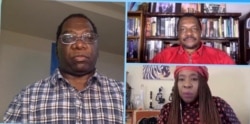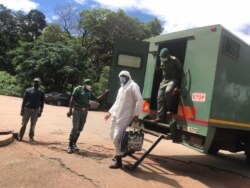Journalist Hopewell Chin'ono has been making headlines in Zimbabwe for his multiple arrests, triggered last year by his social media posts highlighting government corruption.
Now, just recently released on bail for yet another alleged violation, Chin'ono is making fresh headlines, this time for rapping.
A tweet of Chin'ono rapping a reggae beat on the level of looting by Zimbabwean government officials and members of the ruling Zanu-PF party, has set yet another local Twitter record for the award-winning journalist.
His original tweet of the song on January 31 has generated thousands of visits, 1,200 comments, almost 3,000 retweets and other reactions.
In an exclusive interview with VOA Zimbabwe Service's Livetalk, Chin'ono explained the meaning of the lyrics of his rap song, #DemLoot.
“It was never put out as a piece of journalism. This was just Hopewell the citizen. I was in my study (room) exactly where I’m sitting (during the interview) and I was reading, got bored and I started reflecting, as I have been doing when I was in prison, about conversations I was having with so many youths last year when I was accusing them of not participating in political, economic and social issues that affect their day to day lives. And then I decided to say, oh you know, a lot our youths in Zimbabwe listen to reggae music, let me try and just do something talking about the issues that I encouraged them to engage with on a day to day basis and see how they will react. So, that’s what I did and when I put it out there it went viral. It was never a form of journalism. It was just me as a citizen interacting with the youth and using a language and art form that they are more comfortable with.”
Asked if this was not crossing the line of journalism that may get him in trouble again with the government, Chin'ono defended his actions, saying he is only speaking the truth.
“It doesn’t discredit me. Newspapers have editorials. They comment on issues that affect citizens that they are covering. Television stations have talk shows like the one that we have at the moment. People are expressing opinion and what I did with that song, I was expressing opinion and fact because it is a fact, and I have proved it, that money is being looted. So, I was just saying what I say when I write newspaper columns for international newspapers like the New York Times or The Guardian or when I’m reporting for the BBC. I was just doing it using an art form that I knew would be more receptive, the youth would be more receptive to it if I use that art form. The words that I used in that song could have been in an article in the New York Times. So, I just see it as a different platform that I used but otherwise there is no difference.”
Chin'ono, who is out on bail for three separate charges, the major one being that he instigated citizens to participate in a demonstration on July 31, 2020, said he felt compelled as a journalist to investigate corruption in Zimbabwe as many African nations are facing similar problems.
He said his DemLoot song has highlighted corruption in high places worldwide with some top artistes like Zimbabwean singer Vusa Mkhaya of Insingizi and famous guitarist Helen Ebe crafting their own versions.
“It shows that what I was saying affects many people. Vusa Mkhaya’s version is actually the most favorite out of all the versions that have been done and I have convinced him that he needs to do a long song and is going to do it. There is actually one of the most famous guitarists in Africa called Helen Ebe. She is Nigerian. She is actually working on her version because these issues are not specifically Zimbabwean. They affect all of us on the continent. There is corruption across the continent. It is the levels that I guess differ and attenuate. It’s worse in Zimbabwe.
“There are only 22 countries that are worse than Zimbabwe. That’s how bad our corruption has become. So, it is important for people like yourself and myself who have media voices and we can reach huge numbers of people to engage and also remind the policy makers that their role in society is to create a conducive environment for the citizens to thrive and not to take that which is meant to build hospitals, roads, schools or create employment for our people.”
Some artistes, who have also released their own DemLoot versions are in China, South Africa, Zimbabwe, Lesotho, Botswana, Britain, Australia and other nations.







